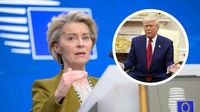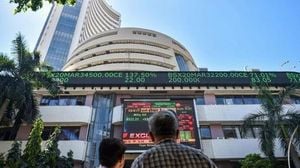As tensions escalate in the ongoing trade war initiated by former U.S. President Donald Trump, the global economic landscape is experiencing significant upheaval. Trump's recent tariff policies have triggered a wave of retaliatory measures, particularly from China and the European Union (EU), leading to a sell-off in stock markets worldwide.
On April 9, 2025, Trump announced a staggering 104 percent tariff on all Chinese imports, a move that has sent shockwaves through the financial markets. According to White House spokeswoman Karoline Leavitt, these tariffs are part of a broader strategy to confront what Trump perceives as unfair trade practices. This latest escalation has resulted in the technology index Nasdaq 100 plummeting over 20 percent from its record high in February.
In response to Trump's aggressive tariff strategy, China has vowed to "fight to the end" in the tariff dispute. The Chinese government announced it would impose an 84 percent import tax on U.S. goods, significantly increasing from previous tariffs. A statement from the Chinese Ministry of Commerce expressed deep concern and strong opposition to Trump's actions, labeling them as reckless. Furthermore, China has issued a travel risk warning for its citizens considering trips to the U.S., citing deteriorating economic and political relations.
Simultaneously, the EU has approved initial retaliatory tariffs on U.S. imports, set to take effect next week. These tariffs, ranging from 10 to 25 percent, will target products such as steel, textiles, corn, soybeans, and poultry, with additional tariffs on food items like beef and citrus fruits expected by mid-May. EU officials have criticized the U.S. tariffs on steel and aluminum imports, which they argue are unjustified and harmful, impacting exports worth approximately 26 billion euros.
The EU's response is calculated to inflict significant pain on the U.S. economy, with plans to impose tariffs of up to 25 percent on U.S. exports valued at around 22.1 billion euros. This move is part of a broader strategy to pressure the U.S. into fair negotiations. EU Commission President Ursula von der Leyen emphasized the importance of a strong, reformed trade system that is fair and based on equal competition.
Despite the mounting pressure, Trump has remained steadfast in his approach, dismissing calls for a postponement of the tariffs. He believes these measures will ultimately enrich the U.S. economy, stating, "The tariffs will make this country very rich." However, financial experts warn that his policies could lead to a recession, as inflation rises and economic output declines.
In the wake of these developments, global stock markets have reacted sharply. The FTSE 100 index in the UK fell by 3.3 percent, while both the German Dax and the French Cac 40 dropped by 4 percent. The Dax, which had previously shown signs of recovery, began the trading day down 2.4 percent, reflecting the broader market turmoil.
The U.S. Federal Reserve has also expressed concerns regarding the economic implications of Trump's tariffs. Economists warn that the combination of increased tariffs and potential retaliatory measures could lead to a prolonged bear market. Notably, the Russell 2000 index is already in bear market territory, with the S&P 500 teetering on the brink as it approaches a 19 percent decline.
As the situation unfolds, experts are divided on the potential outcomes. Some economists, like Adam Posen, advocate for an asymmetric trade war approach, suggesting that Europe should leverage its position to counteract U.S. tariffs. Others like economist Barry Eichengreen assert that Trump's actions will inevitably lead to a decline in the dollar's value and increased inflation.
Additionally, the Spanish central bank has announced plans to lower its economic forecast for 2025 due to the adverse effects of U.S. tariffs. Central bank chief Jose Luis Escriva indicated that the economic outlook is now more uncertain, with job creation likely to be impacted.
Meanwhile, Trump advisor Peter Navarro has found himself embroiled in controversy as it was revealed that he fabricated a character named Ron Vara to support his views on trade with China. This revelation has raised questions about the credibility of the administration's narrative regarding the trade war.
As the EU and China prepare for further confrontations, the global economy braces for the potential fallout. The fear of a global recession looms large, with many analysts warning that the current trajectory could lead to a significant downturn. The prospect of a prolonged trade war raises concerns about the stability of international markets and the economic well-being of nations worldwide.
The stakes are high as the world watches the unfolding drama of tariffs and trade negotiations. With both sides seemingly entrenched in their positions, the path to resolution remains uncertain. Will diplomacy prevail, or are we witnessing the beginning of a new era of economic conflict?





